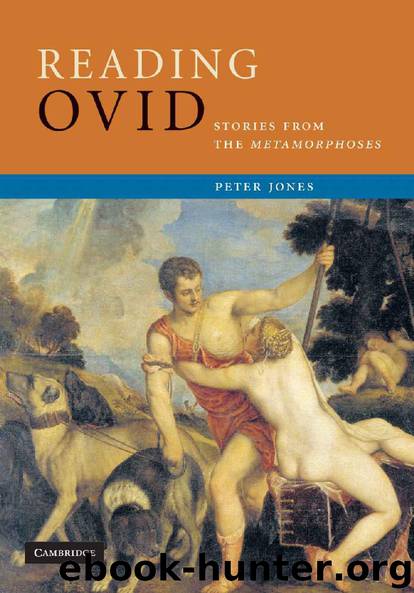Reading Ovid by Peter Jones

Author:Peter Jones [Jones, Peter]
Language: eng
Format: epub
ISBN: 9780521849012
Publisher: Cambridge University Press
Published: 2007-03-07T23:00:00+00:00
Notes
55–64: Ovid at once establishes the location of the story: in the East (56), in Babylon (58). Its walls of baked mud (58) caused some comment in countries like Greece and Italy, where there was plenty of stone for building. The lovers live in adjacent properties (57), and Ovid describes how their young love, beginning so innocently, grew over time (59–60); but parental disapproval drove them ‘underground’, making the whole ‘affair’ all the more exciting (61–4). All this is sweetly stereotypical. Ovid well understands the clichéd thrills of private youthful infatuation – he sees into their minds and produces a delightfully sympathetic and amusing account of young ‘lurve’.
65–80: In this new situation, the pair are at first able to communicate only through signs to each other when they just happen to meet (63). But there is a hole in the garden-wall that separates the properties (not an internal house-wall; 79, 91–2 make it clear the wall is outside, because they have to leave it when night falls). This pariēs . . . commūnis both separates them and allows them to communicate privately with each other – love picks up everything, Ovid charmingly puts it, as he drops into a complicitous apostrophe with uīdistis (68) – and they are thus enabled to pour out their sweet nothings without anyone else hearing (tūtae, 69–70). If they cannot hold each other, they can at least try to catch each other’s breath – a delightful conceit (72). They personify the wall, accusing it of getting in the way (73–7, cf. Narcissus at 3.448–50); not that they wish to offend it . . . (76–7). Note that innocent first love has now become a passionate desire for intercourse (tōtō . . . corpore, 74). They stop talking this sort of juvenile drivel (tālia . . . nēquīquam 78) only when night falls, when they part with unavailing kisses (79–80). Ovid here brilliantly recreates the intensely introspective world of adolescent love, which means so much to the young lovers and is the source of such innocent amusement for everyone else.
81–92: Next day the young lovers decide to act. Spurred by their whispered (83) despair at their situation (84), they agree to break out. Breathlessly, they plot the escapade. The absurdly detailed 84–6 (which boils down to ‘step one: leave town’) captures their excited sense of planning, 87 their sense of danger; 88–90 finally gets to the practical point. Given that they met soon after dawn (81–2; ah, young love!), 91–2 suggests it has taken much of the day to come up with this exciting adventure. tardē is a neat touch. Time usually flies for lovers, but because they are in such a haste to escape together, now it drags.
93–104: ‘Skilful’ (93) Thisbe carefully opens the door and follows the plan to the letter, obediently sitting down under the tree (95), covering her face in addition (94), and terribly excited by the daring of it all (96). But when the moon (99, cf. tenebrās 93) conveniently reveals
Download
This site does not store any files on its server. We only index and link to content provided by other sites. Please contact the content providers to delete copyright contents if any and email us, we'll remove relevant links or contents immediately.
4 3 2 1: A Novel by Paul Auster(12378)
The handmaid's tale by Margaret Atwood(7758)
Giovanni's Room by James Baldwin(7333)
Asking the Right Questions: A Guide to Critical Thinking by M. Neil Browne & Stuart M. Keeley(5765)
Big Magic: Creative Living Beyond Fear by Elizabeth Gilbert(5758)
Ego Is the Enemy by Ryan Holiday(5420)
The Body: A Guide for Occupants by Bill Bryson(5083)
On Writing A Memoir of the Craft by Stephen King(4937)
Ken Follett - World without end by Ken Follett(4726)
Adulting by Kelly Williams Brown(4568)
Bluets by Maggie Nelson(4548)
Eat That Frog! by Brian Tracy(4527)
Guilty Pleasures by Laurell K Hamilton(4442)
The Poetry of Pablo Neruda by Pablo Neruda(4099)
Alive: The Story of the Andes Survivors by Piers Paul Read(4024)
White Noise - A Novel by Don DeLillo(4006)
Fingerprints of the Gods by Graham Hancock(3999)
The Book of Joy by Dalai Lama(3978)
The Bookshop by Penelope Fitzgerald(3844)
